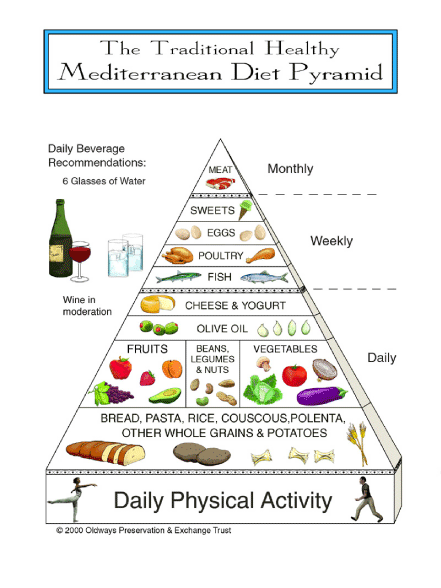I use the word “diet” in this section not as a weight-loss program, but “the usual food and drink of a person.” Twenty-one countries have a coastline of the Mediterranean sea, and additional countries are in the Mediterranean region. “Traditional” refers to the mid-20th century. Observational studies around that time associated the Mediterranean diet with longer life spans, reduced rates of chronic disease (less cardiovascular disease and dementia), and fewer cancers of the colon, breast, prostate, and uterus. There is no monolithic, immutable, traditional Mediterranean diet. But there are similarities among many of the regional countries that tend to unite them, gastronomically speaking. Greece and southern Italy are particularly influential in this context.
So here are the characteristics of the traditional, healthy Mediterranean diet:
- It maximizes natural whole foods and minimizes highly processed ones
- Small amounts of red meat
- Less than four eggs per week
- Low to moderate amounts of poultry and fish
- Daily fresh fruit
- Seasonal locally grown foods with minimal processing
- Concentrated sugars only a few times per week
- Wine in low to moderate amounts, and usually taken at mealtimes
- Milk products (mainly cheese and yogurt) in low to moderate amounts
- Olive oil as the predominant fat
- Abundance of foods from plants: vegetables, fruits, beans, potatoes, nuts, seeds, breads and other whole grain products
- Naturally low in saturated fat, trans fats, and cholesterol
- Naturally high in fiber, phytonutrients, vitamins (e.g., folate), antioxidants, and minerals (especially when compared with concentrated, refined starches and sugars in a modern Western diet)
- Naturally high in monounsaturated and polyunsaturated fats, particularly as a replacement for saturated fats




